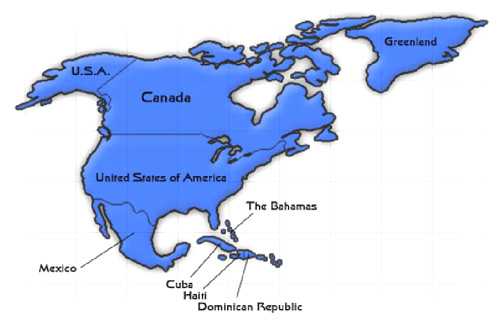Overview
The thirty countries in North America and the Caribbean include three of the largest countries of the world: Canada, the United States and Greenland. Communities from every ethnic group in Europe have settled in the Americas. It is probably the region with the least religious discrimination and it has been the largest sending base in the world for missionaries; however, this is rapidly changing. Eighty-three least-reached people groups remain here. Canada has the largest percent of population that is least-reached with 4.6% in sixteen groups (nearly 1.5 million people); however, the United States has the largest population of least-reached people at over 3.5 million in twenty-four people groups. Mexico has almost half a million people in eighteen people groups.
 |
If the gospel is not sent, sometimes people come to hear the gospel in a land where churches are plentiful. This could be the legacy of North American Christianity. Students, immigrant communities and indigenous peoples remain a challenge for the gospel in the world’s wealthiest continent and the economic engine on which the world’s economy depends for growth. Less than fifteen percent of international students in the US today are touched by any Christian ministry. Additionally, seventy percent will never see the inside of an American home and eighty percent will never have a Christian friend. Sadly, American churches pray for Muslim countries but do very little to reach Muslims in their own communities. In addition, only in Greenland are Native Americans a majority; elsewhere they are often a marginalized underclass alongside a large majority that overran their continent.
Pray for a re-energizing of the body of Christ in North American and the Caribbean to come alongside the rapidly emerging harvest forces from China, Russia, Latin America, India, Africa and other places.
Prayer Points
- Turning obstacles into opportunities. Pray that God causes North American/Caribbean believers to value all the redemptive gifts in every culture. Pray he gives them the ability to respond with his grace and love to the challenges of building relationships across cultures.
- Seekers to find Jesus. Pray for those who have migrated or come as students, overseas workers, immigrants or refugees seeking education, opportunity or fleeing war, famine or deprivation to find Jesus as their resource, refuge, teacher and friend.
- Turning the hearts of the fathers to the children. Pray for God to supernaturally reconcile the older generation with the younger, so that families are God-honoring examples and faith in God is passed from the older generation to the younger. Pray for the changed lives of those coming to Christ as young people—and that they will win their families to Christ.
- Building bridges of friendship. Pray for God to empower believers to creatively build friendships. Pray that he will help believers share his love as they connect with those different in language, culture or belief.
- Relevant faith. Pray for God to be alive in believers of North America and the Caribbean so their lives are the message. Pray they live lives worthy of imitation and bring a living witness to least-reached peoples. Pray for a re-energizing of the people in the body of Christ in North America and the Caribbean.
Links
- Resources to pray, to mobilize prayer and to do outreach.
- Discover North America and Caribbean’s eighty-eight least-reached peoples.
- Pray for the peoples of North America and the Caribbean region.
- Obtain daily prayer guides for peoples of this region.
![]()
Background
 |
Is North America Running Out of Unreached People Groups?
(by Keith Carey)
Putting together an issue on North America is both maddening and delightful. It is maddening because there are so few unreached people groups that we sometimes have to broaden the definitions more than I would like. But it is also delightful because there are so few unreached people groups that the task is nearly complete in this part of the world! Mexico and her two English-speaking neighbors to the north have different problems in reaching the remaining unreached people groups.
In Mexico, there are eighteen unreached people groups, according to the Joshua Project list. Of those, three are immigrant groups and the remaining fifteen are small subgroups of Mexico’s Mixtecs, Zapotecs, Mixes and Nahuats. Global Recordings Network is doing all it can to make sure these groups get a gospel message in their own dialect. Because there are subgroups of each of these people group clusters that already have believers, it should be possible to reach them in the next couple of years.
North of the Mexican border there are very few unreached indigenous people group, according to the Joshua Project list. The United States has twenty-one unreached people groups and Canada has sixteen, almost all of which are immigrant groups. It will take a different approach to reach the immigrant communities in Anglo America than it does to reach indigenous peoples in Mexico.
Although there are many immigrant groups in the US and Canada that have a Christian witness, many of them do not. Those living in their homeland are extremely difficult to reach. For example, when was the last time you heard of a breakthrough among Somalis in Somalia or Kenya? But they can be reached in Minneapolis, Minnesota. Although there are efforts to reach Kurds in Iraq, and there are now a few Kurdish congregations in that part of the world, the work can easily run afoul of the Muslim majority. Kurds in San Diego or Nashville do not have the same hurdle between them and a Christian witness. Likewise, Pushtuns from Afghanistan are difficult to reach in that land where strife is an everyday activity. But many of them have settled in Fremont, California, where Christians can reach them if they are willing to do so.
North America’s South Asian Mission Field
In the early 1900s, Punjabi Sikhs began to seek their fortunes in Canada. At first, few women came. The men earned relatively good wages in the lumber industry of British Columbia. Instead of returning to India as they originally expected, their women began to arrive and they raised families in this beautiful land. Several decades later, others went to California’s fertile Central Valley to raise crops. Most of the latter are Jats, one of India’s most accomplished agricultural groups. Jats learned the advanced agricultural techniques of the Green Revolution and have put these techniques into practice in Canada and California, as well as the Punjab.
In 1965, American President Lyndon Johnson signed a new immigration law that prevented “national origins” from being a basis for allocating immigration quotas to various countries. For the first time, the US could not give preferential treatment to European or Latin American immigrants. The only criteria was that the new immigrants had to be well-educated.
Since that time, India has been sending its best and brightest to the United States. For many years, the number of people trained in India’s fine high-tech schools far exceeded the number of jobs offered in the subcontinent. American companies offered them jobs. ![]()
Those with business skills have helped the United States by creating startup businesses. Some of the richest people in the world are Indian nationals whose efforts straddle both countries. Many Indian entrepreneurs are in the high-tech field. A key group of Indian business people are from the western state of Gujarat. They are Patels, and many of them own motels. At this time, most are involved with small, cheaper franchises, but some are moving into the higher end market.
Why Is the Indian Diaspora so Significant in God’s Economy?
We know that there are excellent efforts in India to reach out for Christ. For the most part, however, these efforts are affecting only the lower castes, and the high caste groups remain unreached. North America is a magnet for the high-caste people groups. The late Mahendra Singhal, a high-caste Brahmin himself, pointed out that his people have a knack for mastering complicated mathematics. They are prominent among the computer software engineers who live in America. Although India Gospel Outreach is doing a fine job of reaching Sikhs for Christ in India, it is still difficult to get through to the prosperous Jats, the same people who are easy to reach in California. A Patel Christian believer is unheard of in both India and the United States; however, in the latter, they have a chance to hear the gospel. There is an effort to reach the unreached Sindhi peoples, many of whom are prominent in businesses; however, there is still no fellowship of Sindhis in North America.
The problem is that the laborers are very few. There are those who are mission-minded in both Canada and the US; however, the difficulty is finding those who will reach out to the most unreached peoples on the continent.
Pray that God will raise up workers to reach out to the unreached Muslim groups of Saudi Arabs, Kurds, Somalis and Afghan Pushtuns. Pray that God will raise up his chosen servants to reach out to the most unreached of the South Asian Diaspora, such as the Patels, Brahmins, Jats, Bangladeshis and Sindhis.
How Do We Begin an Outreach?
Reaching out to people from another country is not easy. They may already have their friendship networks in place. Often they get suspicious that you are trying to “convert” them. However, there are groups out there that can help. One of them is EthnoServe, whose mission it is to “place long and short-term partners around the US, focusing on networking with other organizations to help churches and individuals reach the ethnic communities within their neighborhoods. Their work may involve developing friendships, teaching English or providing other services as they share their faith in Christ.”
Below are seven steps we can take to reach out to those around us:
- Begin with prayer. Ask God to show you the doors he wants you to open. Pray with people from your church for direction.
- Get over the reluctance to speak of spiritual things with strangers. To many people, especially Muslims, this is perfectly natural.
- Be hospitable. Hospitality is a gift well honored in most of the world. Many of these same people may never see the inside of an American home otherwise.
- Equip yourself with some basic cross-cultural resources. Here are some helpful websites that you will want to bookmark: www.ethnoserve.org, www.ethnicharvest.org and www.ethnicamerica.com.
- Develop networks of Christians in all kinds of professions who will work together to plant churches among various people groups. You can work within the network you have in your own profession. Seek out believers in your profession and begin to formulate a strategy for reaching the unreached in your community.
- Adopt a people group. Are there churches willing to send someone to live and work among the people group? You may have some believers who are ready to help.
- Serve immigrant Christians in your area. They might need help with English lessons, etc. These people might be your best partners in outreach. (LWP editor’s note: A great resource for ethnic mapping near you is http://www.peoplegroups.info/.)
